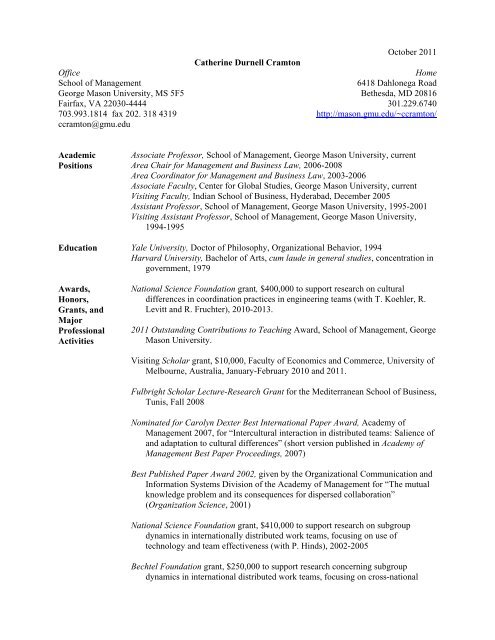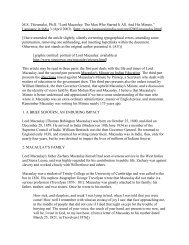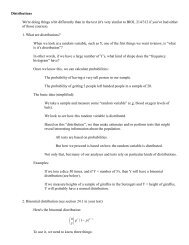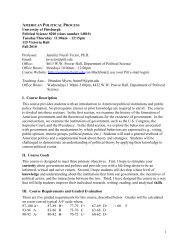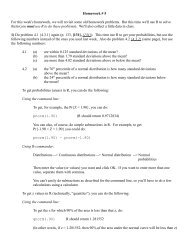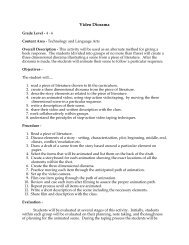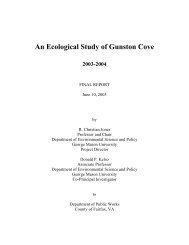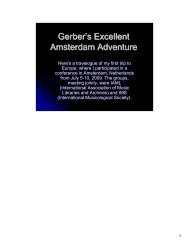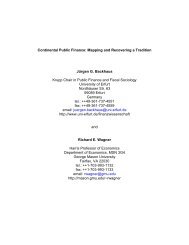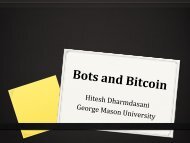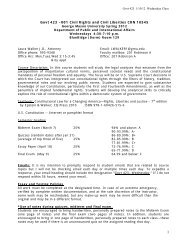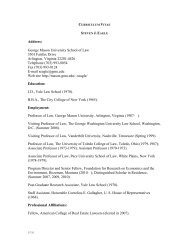Vita - George Mason University
Vita - George Mason University
Vita - George Mason University
You also want an ePaper? Increase the reach of your titles
YUMPU automatically turns print PDFs into web optimized ePapers that Google loves.
Office<br />
School of Management<br />
<strong>George</strong> <strong>Mason</strong> <strong>University</strong>, MS 5F5<br />
Fairfax, VA 22030-4444<br />
703.993.1814 fax 202. 318 4319<br />
ccramton@gmu.edu<br />
Academic<br />
Positions<br />
Education<br />
Awards,<br />
Honors,<br />
Grants, and<br />
Major<br />
Professional<br />
Activities<br />
Catherine Durnell Cramton<br />
October 2011<br />
Home<br />
6418 Dahlonega Road<br />
Bethesda, MD 20816<br />
301.229.6740<br />
http://mason.gmu.edu/~ccramton/<br />
Associate Professor, School of Management, <strong>George</strong> <strong>Mason</strong> <strong>University</strong>, current<br />
Area Chair for Management and Business Law, 2006-2008<br />
Area Coordinator for Management and Business Law, 2003-2006<br />
Associate Faculty, Center for Global Studies, <strong>George</strong> <strong>Mason</strong> <strong>University</strong>, current<br />
Visiting Faculty, Indian School of Business, Hyderabad, December 2005<br />
Assistant Professor, School of Management, <strong>George</strong> <strong>Mason</strong> <strong>University</strong>, 1995-2001<br />
Visiting Assistant Professor, School of Management, <strong>George</strong> <strong>Mason</strong> <strong>University</strong>,<br />
1994-1995<br />
Yale <strong>University</strong>, Doctor of Philosophy, Organizational Behavior, 1994<br />
Harvard <strong>University</strong>, Bachelor of Arts, cum laude in general studies, concentration in<br />
government, 1979<br />
National Science Foundation grant, $400,000 to support research on cultural<br />
differences in coordination practices in engineering teams (with T. Koehler, R.<br />
Levitt and R. Fruchter), 2010-2013.<br />
2011 Outstanding Contributions to Teaching Award, School of Management, <strong>George</strong><br />
<strong>Mason</strong> <strong>University</strong>.<br />
Visiting Scholar grant, $10,000, Faculty of Economics and Commerce, <strong>University</strong> of<br />
Melbourne, Australia, January-February 2010 and 2011.<br />
Fulbright Scholar Lecture-Research Grant for the Mediterranean School of Business,<br />
Tunis, Fall 2008<br />
Nominated for Carolyn Dexter Best International Paper Award, Academy of<br />
Management 2007, for “Intercultural interaction in distributed teams: Salience of<br />
and adaptation to cultural differences” (short version published in Academy of<br />
Management Best Paper Proceedings, 2007)<br />
Best Published Paper Award 2002, given by the Organizational Communication and<br />
Information Systems Division of the Academy of Management for “The mutual<br />
knowledge problem and its consequences for dispersed collaboration”<br />
(Organization Science, 2001)<br />
National Science Foundation grant, $410,000 to support research on subgroup<br />
dynamics in internationally distributed work teams, focusing on use of<br />
technology and team effectiveness (with P. Hinds), 2002-2005<br />
Bechtel Foundation grant, $250,000 to support research concerning subgroup<br />
dynamics in international distributed work teams, focusing on cross-national
Research<br />
Interests<br />
Publications<br />
learning processes (with P. Hinds and M. Lepper), 2002-2005<br />
Editorial Review Board, Organization Science, 2006-current<br />
Editorial Review Board, Journal of World Business, 2010-current<br />
Representative-at-Large to the Executive Committee of the Organizational<br />
Communication and Information Systems Division of the Academy of<br />
Management, 2004-2007<br />
Newsletter Co-Editor, Organizational Communication and Information Systems<br />
division of the Academy of Management, 2004-2005<br />
Academy of Management Communications Committee, 2003-2004<br />
Organizational Communication and Information Systems Division representative to<br />
the Academy of Management Council, 2001-2003<br />
Finalist, National Decision Sciences Institute Instructional Innovation Award, 1997,<br />
in recognition of the Virtual Learning Environment Project. The project brought<br />
together in teams graduate business students from nine universities around the<br />
world. Tasked with creating a business plan for an Internet-based business,<br />
participants learned about distributed, inter-organizational collaboration<br />
Summer Research Award for Tenure-Track Faculty, <strong>George</strong> <strong>Mason</strong> <strong>University</strong>, 1996-<br />
2000 (eligibility limited to every other year)<br />
Celebration of Learning Grant, <strong>George</strong> <strong>Mason</strong> <strong>University</strong>, 2000. Supporting<br />
continued development of the Virtual Organization Workshop, $2,880<br />
Most Innovative Session Award, Organizational Behavior division of the Academy of<br />
Management, 2000, for “Virtual teams: A new team form for the new century?”<br />
$500<br />
Culture-specific coordination routines<br />
Cross-cultural adaptation in globally distributed teams<br />
Information-sharing and relationship development in distributed work teams<br />
Teamwork in the software development industry<br />
Dynamics of interpersonal conflict<br />
Subgroup dynamics<br />
Impact of technology on teamwork<br />
Köhler, T., Cramton, C.D. & Hinds, P.J. (in press). The meeting genre across<br />
cultures: Insights from German-American collaborations. Small Group Research.<br />
Hinds, P.J. & Cramton, C.D. (2012). Studying global work groups in the field. In<br />
Hollingshead, A. B. & Poole, M. S. (Eds). (2012). Research methods for studying<br />
group and teams: A guide to approaches, tools, and technologies, pp. 105-120<br />
New York: Routledge.<br />
2
Cramton, C.D. & Hinds, P.J. (2009). The dialectical dynamics of nested structuration<br />
in globally distributed teams. In G. Solomon, Ed., Academy of Management Best<br />
Paper Proceedings, on CD ROM.<br />
Cramton, C.D., Orvis, K.L.. & Wilson, J.M. (2007). Situation invisibility and<br />
attribution in distributed collaborations. Journal of Management 33(4), 525-546.<br />
Cramton, C.D. & Hinds, P.J. (2007). Intercultural interaction in distributed teams:<br />
Salience of and adaptations to cultural differences. In G. Solomon, Ed., Academy<br />
of Management Best Paper Proceedings, on CD ROM.<br />
Cramton, C.D. & Hinds, P.J. (2005). Subgroup dynamics in internationally<br />
distributed teams: Ethnocentrism or cross-national learning? Research in<br />
Organizational Behavior, 26, 231-263.<br />
Cramton, C.D. & Webber, S.S. (2005). Relationships among geographic dispersion,<br />
team processes, and effectiveness in software development work teams. Journal<br />
of Business Research, 58(6), 758-765.<br />
Cramton, C.D. & Orvis, K.L. (2003). Overcoming barriers to information sharing in<br />
virtual teams.” In C. Gibson & S. Cohen, Eds., Virtual Teams That Work:<br />
Creating Conditions for Effective Virtual Teams, pp. 214-230. San Francisco:<br />
Jossey Bass.<br />
Cramton, C.D. (2002). Finding common ground in dispersed collaboration.<br />
Organizational Dynamics, 30(4), 356-367.<br />
Cramton, C.D. (2002). Attribution in distributed work groups. In P. Hinds & S.<br />
Kiesler, Eds., Distributed Work: New Research on Working Across Distance<br />
Using Technology, 191-212. Cambridge, MA: MIT Press.<br />
Cramton, C.D. (2001). “The mutual knowledge problem and its consequences for<br />
dispersed collaboration.” Organization Science, 12(3), 346-371.<br />
Scott, D., Cramton, C.D., Gauvin, S., Jones, B. & Steinke, G. (1999). Crossing the<br />
international teaching divide: The evaluation of an Internet-based teaching<br />
project. Journal of Teaching in International Business, 10 (3&4), 61-80.<br />
Cramton, C.D. (1999). Learning through the ages: What adult development theory<br />
brings to management classes. Journal of Management Education, 23(4), 437-<br />
443.<br />
Lobert, B., Cramton, C.D., Gauvin, S. & Scott, D. (1998). Virtual learning<br />
environment: Preparing for knowledge work in the 21 st century. Journal of<br />
Computer Information Systems, 38(4), 1-8.<br />
Cramton, C.D. (1997). Information problems in dispersed teams.” In L. Dosier & J.<br />
Keys, Eds., Academy of Management Best Paper Proceedings, 298-302.<br />
Barry, D., Cramton, C.D. & Carroll, S.J. (1997). Navigating the garbage can: How<br />
agendas help managers cope with job realities. Academy of Management<br />
Executive, 11(2), 26-42.<br />
3
Working<br />
Papers and<br />
Work in<br />
Progress<br />
Invited<br />
Presentations<br />
Conference<br />
Presentations<br />
Cramton, C.D. & Rait, D.S. (1994). Dimensions of work-family interface. The<br />
Community Psychologist, special issue on home-work interface, 27(2), 45-48.<br />
Cramton, C.D. (1993). Is rugged individualism the whole story? Public and private<br />
accounts of a firm’s founding. Family Business Review, 6(3), 233-262.<br />
Cramton, C.D., Köhler, T. & Levitt, R. Coordination of global teamwork: A scriptsbased<br />
view. Revise and resubmit invitation.<br />
Cramton, C.D. & Hinds, P.J. Ticking in different ways: The dialectical struggle to<br />
resolve cross-site differences in globally distributed teams. Revise and resubmit<br />
invitation.<br />
Beyene, T., Hinds, P. & Cramton, C.D. The hidden turmoil of language mandates in<br />
global teams. Revise and resubmit invitation.<br />
Beyene, T., Hinds, P. & Cramton, C.D. The cost of privilege: English language<br />
mandates and power loss in global organizations. Under revision.<br />
Hinds, P.J. & Cramton, C.D. Deepening relational coordination: Why site visits<br />
matter in global work. Under revision.<br />
Department of Management and Marketing, <strong>University</strong> of Melbourne, 2010<br />
<strong>Mason</strong> School of Business, College of William & Mary, 2010<br />
Department of Communication, Cornell <strong>University</strong>, 2010<br />
Tepper School of Business, Carnegie Mellon <strong>University</strong>, 2006<br />
INSEAD, 2005<br />
<strong>University</strong> of Maryland Department of Psychology, 2005<br />
Harvard Business School, 2004<br />
Cognitive Research Exchange Workshop, ICIS 2004<br />
Workshop for U.S. District Court Deputies-in-Charge, 2002<br />
Kogod School of Business, American <strong>University</strong>, 2002<br />
Harvard-MIT Tele-Conference on Virtual Teams Research, 2002<br />
National Graduate Student Webshop, 2000<br />
Stanford Center for Work, Technology and Organization, 1999<br />
R.H. Smith School of Business, <strong>University</strong> of Maryland, 1999<br />
Cramton, C.D., Köhler, T. & Levitt, R. (2011) Cultural coordination scripts in global<br />
engineering teams. Presented at the annual meeting of the Academy of<br />
Management, San Antonio.<br />
Cramton, C.D. & Hinds, P.J. (2010). The dialectical struggle to resolve cultural<br />
differences in global teams. Presented at the annual meeting of the American<br />
Psychological Association, San Diego.<br />
Koehler, T., Cramton, C.D., & Hinds, P.J. (2010). Are there different culture-driven<br />
norms for meetings: Insights from three German-American collaborations.<br />
Presented at the Interdisciplinary Network for Group Research conference,<br />
Arlington, VA.<br />
Cramton, C.D. & Koehler, T. (2010). Culture and coordination in global<br />
engineering teams. Presented at the D.C. Metro Area Teams Research<br />
4
Conference.<br />
Cramton, C.D. & Hinds, P.J. (2009). A cross-site thread: The struggle to resolve<br />
cross-national differences in globally distributed teams. Presented at the annual<br />
meeting of the Academy of Management, Chicago.<br />
Cramton, C.D. & Cronin, M.C. (2008). Triangulation processes. Presented at the<br />
Interdisciplinary Network for Group Research conference, Kansas City, MO.<br />
Cramton, C.D. & Hinds, P.J. (2008). Being in the right place with the right people:<br />
How the structure of offshore collaborations impacts influence dynamics.<br />
Presented at the European Group for Organizational Studies colloquium,<br />
Amsterdam, Netherlands.<br />
Cramton, C.D. & Hinds, P.J. (2008). The nested structuration of salient cultural<br />
differences in internationally distributed teams. Presented at the Davis<br />
Conference on Qualitative Research, Davis, CA.<br />
Cramton, C.D. & Hinds, P.J. (2007). Situated cross-cultural adaptation in<br />
distributed teams: The interpenetration of culture and work. Presented at the<br />
annual meeting of the Academy of Management, Philadelphia, PA.<br />
Hinds, P.J. & Cramton, C.D. (2007). Situated “knowing who”: Why site visits<br />
matter in global work. Presented at the annual meeting of the Academy of<br />
Management, Philadelphia, PA.<br />
Cramton, C.D. & Hinds, P.J. (2007). Leadership, learning and adaptation in<br />
internationally distributed work teams. Presented at the First International<br />
Workshop on Intercultural Collaboration, Kyoto, Japan.<br />
Cramton, C.D. & Hinds, P.J. (2006). Leadership processes in the development of<br />
internationally distributed team collaborations. Presented at the annual meeting<br />
of the Academy of Management, Atlanta, GA.<br />
Köhler, T., Cramton, C.D., & Hinds, P.J. (2006). Design and validation strategies<br />
for qualitative study of international teams. Presented at the Interdisciplinary<br />
Network for Group Research conference, Pittsburgh, Beyene, T., Hinds, P. &<br />
Cramton, C.D. (2005). Language challenges in international work: The impact<br />
of uneven proficiency in the lingua franca. Presented at the annual meeting of<br />
the Academy of Management, Honolulu, HI.<br />
Wiggins, B. & Cramton, C.D. (2005). Situational information sharing, attribution<br />
and performance under distributed and collocated conditions. Presented at the<br />
annual meeting of the Society for Industrial and Organizational Psychology, Los<br />
Angeles, CA.<br />
Cramton, C.D. (2004). Using intergroup theory to conduct international research on<br />
teams. Presentation for Professional Development Workshop, Academy of<br />
Management annual meeting, New Orleans, LA.<br />
Cramton, C.D. & Hinds, P.J. (2003). Subgroup dynamics in internationally<br />
distributed teams: Ethnocentrism or cross-national learning? Presented at the<br />
5
annual meeting of the Academy of Management, Seattle, WA.<br />
Cramton, C.D. & Orvis, K.L. (2002). Attribution behavior in distributed dyads.<br />
Presented at the annual meeting of the Academy of Management, Denver, CO.<br />
Cramton, C.D. & Wilson, J.M. (2002). Explanation and judgment in distributed<br />
groups: An interactional justice perspective. Presented at the annual meeting of<br />
the Academy of Management, Denver, CO.<br />
Cramton, C.D. & Orvis, K.L. (2001). Information processing in virtual<br />
teams.Presented for “Creating conditions for effective virtual teams: A meeting<br />
of minds and sharing of practice,” <strong>University</strong> of Southern California.<br />
Cramton, C.D. (2000). Achieving co-production through inter-organizational teams:<br />
An intergroup perspective. Presented at the annual meeting of the Academy of<br />
Management, Toronto, Canada.<br />
Cramton, C.D. (2000). Attribution processes in dispersed work groups. Presented at<br />
the Conference on Distributed Work, Carmel, CA.<br />
Cramton, C.D. (2000). Inter-organizational teams as an occasion of organizing.<br />
Presented at the 4 th annual conference on Research on Managing Groups and<br />
Teams, Stanford <strong>University</strong>.<br />
Cramton, C.D. & Webber, S.S. (1999). Modeling the impact of geographic<br />
dispersion on work teams. Shared Interest Track presentation at the annual<br />
meeting of the Academy of Management, Chicago, IL.<br />
Cramton, C.D. & Pennarola, F. (1999). Preparing students for virtual teamwork.<br />
Presented at the 6 th annual International Organizational Behavior Teaching<br />
Conference, Milan, Italy.<br />
Cramton, C.D. (1998). Geographic dispersion and knowledge management in<br />
project-based organizations. Presented at the annual meeting of the Academy of<br />
Management, San Diego, CA.<br />
Cramton, C.D. (1997). Information problems in dispersed teams. Shared Interest<br />
Track presentation at the annual meeting of the Academy of Management,<br />
Boston, MA.<br />
Cramton, C.D. (1997). Management skills for the millennium: The Internet and<br />
cross-cultural teaming. Presented at the annual meeting of the Organizational<br />
Behavior Teaching Society, Cleveland, OH.<br />
Boiney, L. & Cramton, C.D. (1997). Initial findings from the AMS-GMU study of<br />
information technology work teams. Presented at the American Management<br />
Systems Fall Associates’ Conference, Fairfax, VA.<br />
Cramton, C.D. (1996). The new (virtual) group project. Presented at the annual<br />
meeting of the Organizational Behavior Teaching Society, Keene, NH<br />
Dissertation The Entrepreneurial Family<br />
6
Primary<br />
Teaching<br />
Interests<br />
Courses<br />
Taught<br />
Special<br />
Projects<br />
Media<br />
Exposure<br />
Organizational behavior<br />
Managing virtual work<br />
Cross-cultural and global management<br />
Teamwork, communication, and interpersonal dynamics<br />
Leadership, GMU Technology Management master’s degree program<br />
Global Business Perspectives (Argentina/Brazil, 2011; Turkey/Hungary, 2010;<br />
Tunisia, 2008), GMU MBA and Technology Management master’s degree<br />
programs<br />
Managing Virtual Work, GMU MBA program and Indian School of Business MBA<br />
program, Hyderabad, India<br />
Cross-Cultural and Global Management, GMU undergraduate business program<br />
Teamwork and Interpersonal Dynamics, GMU Technology Management master’s<br />
degree program<br />
Leadership in Life Stories, Senior Honors Seminar, GMU undergraduate business<br />
program<br />
Organizational Behavior, GMU MBA, EMBA, and undergraduate programs and<br />
Mediterranean School of Business, Tunis<br />
Organization Theory and Development, GMU undergraduate program<br />
Cross-Cultural Learning Laboratory, 2010. Partnered with Johannes Kepler<br />
<strong>University</strong> (Austria) and the <strong>University</strong> of Melbourne (Australia) to offer a four-<br />
week cross-cultural learning experience to students in MGMT 461, Cross-<br />
Cultural and Global Management.<br />
Cross-Cultural Learning Laboratory, 2009. Partnered with the Turku School of<br />
Economics (Finland) to offer a seven-week cross-cultural learning experience to<br />
students in MGMT 461, Cross-Cultural and Global Management.<br />
Cross-Cultural Learning Laboratory, 2007. Partnered with the Niels Brock Business<br />
Academy (Denmark) and Ludwig-Maximilians-Universität (Germany) to offer a<br />
six-week cross-cultural learning experience to students in MGMT 461, Cross-<br />
Cultural and Global Management<br />
Virtual Organization Workshop, 1998. Virtual Organization Workshop 2, 1999,<br />
creator and project leader. The project brings together graduate business classes<br />
at three universities around the world for a six-week collaborative technology-<br />
enabled project. Partners in 1999 were <strong>University</strong> of Auckland and <strong>University</strong> of<br />
Western Australia. Partners in 1998 were Carnegie Mellon <strong>University</strong> and<br />
Bocconi <strong>University</strong> (Milan). Research data collected<br />
Partners for the Study of Project Leadership, 1998-2000. With GMU Prof.<br />
Richard Klimoski, I formed a consortium of five high technology businesses and<br />
a team of researchers to identify critical leadership competencies in project-based<br />
organizations<br />
“Teams without borders.” American Management Association newsletter, June 2006.<br />
“You’ve got soliloquy.” Toronto Globe and Mail, September 28, 2002.<br />
7
Ad Hoc<br />
Reviewing<br />
Activity<br />
Major<br />
Service<br />
Activities<br />
“E-Mail: The “E” doesn’t mean easy.” BusinessWeek Online, June 19, 2001.<br />
“Bumpy road for teleworkers,” Palo Alto Weekly, October 27, 1999.<br />
“The luck and loneliness of the long-distance worker,” Stanford <strong>University</strong> News<br />
Service, September 8, 1999, distributed nationally to various media.<br />
“Virtual learning environment: Preparing for the knowledge age.” Decision Line,<br />
December-January, 1999.<br />
“Working together but apart,” Management Review, September 1998.<br />
“New team building techniques and skills needed for electronic collaboration across<br />
long distances,” <strong>Mason</strong>Business, 2 (1), 1997.<br />
Academy of Management Journal<br />
Academy of Management Review<br />
Communications of the ACM<br />
Family Business Review<br />
Hawaii International Conference on System Sciences<br />
Information & Organization<br />
Information Systems Research<br />
International Conference on Information Systems<br />
International Journal of Conflict Resolution<br />
Israeli Science Foundation<br />
Journal of Applied Behavioral Science<br />
Journal of Computer-Mediated Communication<br />
Journal of Engineering and Technology Management<br />
Journal of Management<br />
Journal of Management Education<br />
Journal of Management Inquiry<br />
Journal of Management Studies<br />
Journal of Organizational Behavior<br />
Journal of World Business<br />
Management International Review<br />
Management Science<br />
MIS Quarterly<br />
National Academy of Science<br />
National Science Foundation<br />
Organizational Research Methods<br />
Organization Science<br />
Organizational Communication and Information Systems division, Academy of<br />
Management<br />
Organization Studies<br />
Social Sciences and Humanities Research Council of Canada<br />
<strong>University</strong> Steering Committee, Human Subjects Review Board review, 2010-2011.<br />
<strong>University</strong> Honors College Advisory Board, 2010-current<br />
8
Professional<br />
Experience<br />
Action editor, Organizational Communication and Information Systems division,<br />
Academy of Management annual meeting, 2009.<br />
Program Committee, International Workshop on Intercultural Communication, 2007<br />
SOM Committee on Promotion, Tenure & Renewal, 2004-2006<br />
Management Area Committee for Renewal and Tenure cases, 2002-3, 2006-2008<br />
<strong>George</strong> <strong>Mason</strong> <strong>University</strong> Human Subjects Review Board, 2002-2004<br />
Management area faculty recruiting, Chair, 2004. Member, 1999-2002, 2005-2007<br />
SOM Graduate Policy Committee, 1998-2002<br />
Search Committee for Director of the Executive MBA Program, 2002<br />
Search Committee for Associate Dean for Undergraduate Programs, 2001<br />
Admissions Committee, Technology Management Program, 2002<br />
Ad hoc Committee for Annual Review of Faculty Teaching Performance, 2001<br />
Technology Management Program Development Committee, GMU School of<br />
Management, 1995-1998<br />
Ph.D. dissertation committees, GMU Industrial/Organizational Psychology Program:<br />
Cindy Parker (1998), Lori Zukin (1999), Sheila Simsarian Webber (2000),<br />
Christina Greathouse (2001), Kara Orvis (2004), Eric Barger (2004), Bryan<br />
Wiggins (2007), Tine Koehler, (2007)<br />
Master’s thesis committees: Valentina Korol, Communications (1999); Christine<br />
Sharp, MAIS (2000)<br />
Bachelor of Individualized Study project advisor: Erik Hartman (2002)<br />
Media liaison/Legislative assistant, U.S. Rep. Michael DeWine, 1983-6<br />
Reporter and columnist, Springfield (OH) News-Sun, 1982<br />
Reporter, Saint Marys (OH) Evening Leader, 1980-1<br />
Languages English, French (intermediate)<br />
9


